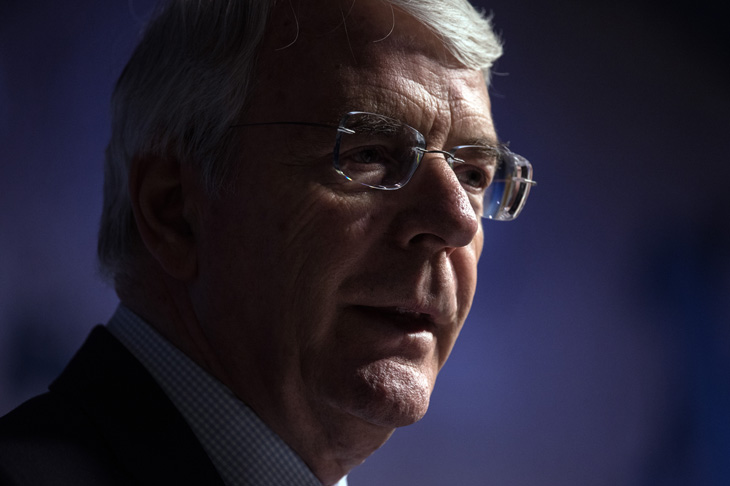As Prime Minister, John Major was intolerant of opposition from within the Conservative party over the EU — memorably calling Maastricht rebels ‘bastards’. It was unwise, and the bad blood it created within his party has been swirling around ever since. Now that the tables have turned and Sir John now finds himself the rebellious outsider on Europe, it is tempting for those on the Conservative party’s Eurosceptic wing, who for so long were denounced as freaks, fruitcakes and swivel–eyed loons, to take the same approach. Their instinct is to denounce Sir John, Michael Heseltine, Ken Clarke and others as dinosaurs seeking to deny the will of the British people. A more responsible approach would be to listen to the Europhiles with grace — and respectfully disagree.
Sir John, in any case, does not deserve to be lumped together with Heseltine and Clarke. In contrast to the other two — who were both stalwarts of his cabinet — he conceded in his speech this week that the result of the referendum must be respected rather than overturned. Unlike Tony Blair, he is not trying to establish any kind of rearguard movement to frustrate the government’s strategy. He is simply asserting that his views have not changed since the referendum and its result has not ended his concerns.
Some of Brexit’s most prominent figures are in danger of showing a disregard bordering on contempt for the 48 per cent who believed our future was more secure within the European Union.
It is true that plenty of contempt is being shown in the other direction too, by Remainers who, for example, accuse elderly Leave voters of ‘stealing their future’ or who question the right to vote of those whom they consider stupid. But there is an obvious difference: the Brexiteers won. They do not need to keep on fighting the referendum. The Commons has voted in favour of triggering Article 50, and a majority of voters — including many who voted Remain — agree that the government is right to get on with it. Brexit is going to happen. It serves no purpose to abuse the likes of Clarke and Heseltine for following their consciences.
What the government, and others who back Brexit, must do now is listen to critics, analyse their concerns, address them, and attempt to reassure where fears are misplaced. Sir John raises some decent points: might a dispute over the size of our final financial settlement with the EU stand in the way of a trade deal by 2019? Might a drive to establish new trading links and attract foreign investment threaten the welfare state in its current form? There are other concerns too: if talks fail, and Britain falls back on World Trade Organisation rules, what would this mean? This is Plan B. Can we know a little more about it?
The government needs to have answers to these points. The Prime Minister cannot reveal what her negotiating strategy is, nor where her bottom line lies. But she needs to find a way of circumventing the EU officials who are determined to extract a heavy price for Brexit. She needs to mobilise commercial interests across the EU who recognise that a trade deal between Britain and the rest of the EU is in everyone’s interest. It is Brussels grandees like Jean-Claude Juncker who need to be isolated while we forge common cause with those who want to continue to do business with us.
If Britain transforms itself into a ‘radical enterprise economy’ as a result of Brexit, that will be a double gain. But it is right to say more about how a more open and entrepreneurial economy will bring in more revenue for a strong welfare state, and one that is reformed so as to protect the record employment of the last few years. The Leave campaign made a lot of noise about wanting to spend Britain’s EU contributions on the NHS instead. The public is not going to tolerate any attempts to use Brexit to dismantle our health service.
Behind much of the support for Remain lay the sense that anti-immigrant and nativist sentiment was powering the Brexit vote. In her recent Davos speech, Mrs May laid out a convincing response to that concern, saying that Britain will champion free trade in a world where protectionism is on the rise. But she needs to do much more. Assuring all EU nationals resident in Britain that they can stay — a pledge made by every leading figure involved in the Brexit campaign — would be a dramatic and bold move which would also allay some of the concerns about xenophobia of the 48 per cent.
Sir John believed we could be at the heart of the European Union while simultaneously rejecting its pet projects such as the social chapter and the single currency. Leaving, in order to establish a new trading relationship with the EU, is a development which the former prime minister perhaps finds it hard to understand. It will strengthen the Brexiteers’ case if they listen and address these voiced concerns which will only intensify as negotiations get underway.






Comments